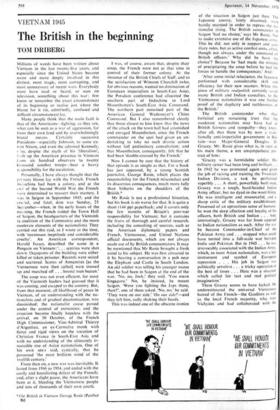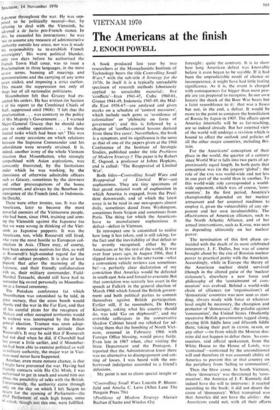VIETNAM 1945
The British in the beginning
TOM DRIBERG
Millions of words have been written about Vietnam in the last twenty-five years, and especially since the United States became more and more deeply involved in this dirtiest, most tragic, most corrupting, and most unnecessary of recent wars. Everybody must have read or heard, or seen on television, something about this war : few know or remember the exact circumstances of its beginning or realise just where the blame for it (in, admittedly, confused and difficult circumstances) lay.
Many people think that the main fault is that of the Americans—fighting, as they are, what can be seen as a war of aggression, far from their own land and by overwhelmingly brutal means. Certainly successive Presidents—especially Johnson. to some ex- tent Nixon, and even the admired Kennedy, v ;io, despite the myth of his liberalism', built up the American presence in Vietnam from six hundred observers to twenty thousand combat troops—bear a heavy r,sponsibility for the escalation.
Personally, I have always thought that the primary blame lay with the French. French Indochina had been a colony, and at the en.' of the Second World War the French sere determined to reassert their mastery. I was, in Saigon in September 1945; and the cru:ial, and fatal, date was Sunday, 23 • Sep:ember—when, in the early hours of the morning, the French raided the Town Hall of Saigon, the headquarters of the Vietminh (a coalition of the Communist and the more moderate elements of the nationalists). They carried out this raid, as I wrote at the time, with 'maximum ineptitude and considerable cruelty'. An American correspondent, Harold Isaacs, described the scene -in a Penguin on Vietnam: `.. . sentries were shot down. Occupants of the building were either killed or taken prisoner. Records were seized and scattered. Scores of Annamites [as the Vietnamese were then called] were trussed up and marched off. . . bound men beaten.'
The coup was not even efficient, for most of the Vietminh leaders had guessed that it was coming, and escaped to the country. But, from that moment, all likelihood of peace in Vietnam, of an understanding with the na- tionalists and of gradual decolonisation, was diminished; the nationalist cause passed under the control of extremists; and the situation become finally hopeless with the arrival, on 30 October, of the French High Commissioner, Vice-Admiral Thierry d'Argenlieu, an ex-Carmelite monk with fierce and rigid views on the vocation of Christian France in South-East Asia and with no understanding of the ultimately ir- resistible rise of Asian nationalism. One of his own ADCS said, cynically, that he possessed 'the most brilliant mind of the twelfth century.'
From then on, a new war was inevitable. It lasted from 1946 to 1954, and ended with the costly and humiliating defeat of the French; and, after a slight pause, the Americans have been at it, bleeding the Vietnamese people and tens of thousands of their own youth.
*The British in Vietnam George Rosie (Panther Its) I was, of course, aware that, despite their coup, the French were not at that time in control of their former colony. At the instance of the British Chiefs of Staff, and to the satisfaction of Winston Churchill (who, for obvious reasons, wanted no diminution of European imperialism in South-East Asia), the Potsdam conference had allocated the southern part of Indochina to Lord Mountbatten's South-East Asia Command. The northern part remained part of the American General Wedemeyer's China Command. But I also remembered clearly that those closest to him knew that the news of the attack on the town hall had astonished and enraged Mountbatten, since the French commander on the spot had given an un- dertaking to take no such drastic action without full preliminary consultation; and that Mountbatten, consequently, felt that he had been 'double-crossed by the French.'
Now I cannot be sure that the history of that episode is as simple as that. For a book has just appeared, by a young Scottish journalist, George Rosie, which places the responsibility for the French misconduct and its disastrous consequences, much more fully than hitherto on the shoulders of the British.* Mr Rosie is not a professional historian, but his book is nl) worse for that. It is quite a short (144 pp) paperback; and it covers only the few months of Britain's post•war responsibility for Vietnam; but it contains the fruits of thorough and careful research, including the consulting of sources, such as the American diplomatic papers and French, Vietnamese, and United Nations official documents, which are not always made use of by British commentators. It may be mentioned that Mr Rosie brought a fresh mind to his subject. He was first attracted to it by hearing a conversation in a pub near the Elephant and Castle in South London. An old soldier was telling his younger mates that he had been in Saigon at the end of the war. 'No, no, Jock,' they said. 'You mean Singapore.' No, he insisted, he meant Saigon. 'Were you fighting the laps there, then?', one of them asked. 'No, no,' he said. 'They were on our side.' On our side—and they left him, sadly shaking their beads.
This was indeed one of the obscene ironies of the situation in Saigon just then. The Japanese enemy, lately disarmed, were hastily rearmed in order to repress the na- tionalist rising. The British commander in Saigon 'had no choice,' says Mr Rosie, but to make extensive use of the Japanese army. This he did, not only in support and aux- iliary roles, but as active combat units, often, though_ not always, under the command of British officers.' Why did he have 'no choice'? Because he 'had made the mistake of precipitating the coup before he had the forces to handle the consequences.' And: 'After some initial reluctance, the Japanese performed with considerable skill and efficiency for their pew masters. While this piece of military realpolitik certainly smed many British and Indian casualties, to the Vietnamese nationalists it was one further proof of the duplicity and ruthlessness of the British.'
The British commander who thus forfeited any remaining trust that the moderate nationalists may have had in British fairness and sympathy—they knew, after all, that there was by now a tradi- tionally anti-imperialist government in Bri- tain—was Major-General Douglas D. Gracey. Mr. Rosie gives what is, in view of his main theme, a not unsympathetic por- trait of him:
`Gracey was a formidable soldier. His military career had been long and brilliant In 1942 he was- promoted again and given the job of raising and training the Twentieth Indian Division, a task he performed superbly . . . A short, powerfully built man, Gracey was a tough, hard-headed Indian Army officer, but no dyed-in-the-wool blimp. He was intelligent and resourceful, and a sharp critic of the military establishment. Possessed of an uproarious sense of humour. he won the deep affection and loyalty of his officers, both British and Indian . . . And, interestingly, Gracey was far from opposed to Indian nationalism as such. After the war he became Commander-in-Chief of the Pakistan Army and . . . stopped what could have turned into a full-scale war between India and Pakistan. But in 1945 . . . he was irrevocably associated with the Indian Army, which, to most Asian nationalists, was a key instrument and symbol of European repression . . . His job in Saigon was
politically sensitive . a tricky operation at the best of times . . . Here was a situation which called for tact and real political imagination.' These Gracey seems to have lacked. He underestimated the universal Vietnamese hatred of the French—the Gaullists as well as the local French majority, who were Vichyites and had collaborated with the
Japanese throughout the war. He was sup- posed to be politically neutral—but, by refusing to deal with the Vietminh, he adopted a de facto pro-French stance. In this, he exceeded his instructions: he was 'not to assume any measure of administrative authority outside key areas, nor was it made his responsibility to re-establish French sovereignty'. His worst political blunder, only two days before he authorised the French Town Hall coup, was to issue a Proclamation in three languages, in the most severe terms, banning all meetings and demonstrations and the carrying of any arms (even sticks), and imposing a strict curfew. This meant the suppression not only of thugs but of all nationalist politicians.
Mountbatten felt that Gracey had ex- ceeded his orders. He has written (in Section
E of his report to the Combined Chiefs of
Staff, suppressed until 1968): 'I felt that the proclamation .. . was contrary to the policy of His Majesty's Government. . . I warned
Major-General Gracey that he should take care to confine operations . . . to those
limited tasks which had been set.' This was one of many occasions on which relations between the Supreme Commander and his subordinate were severely strained. It is, indeed, another irony of the whole Vietnam situation that Mountbatten, who strongly sympathised with Asian aspirations, was constantly frustrated, by the limitations under which he was working, by the clumsiness of otherwise admirable officers such as Gracey, sometimes by the slowness and other preoccupations of the home government, and always by the Bourbon in- transigence of the French (and, in Indonesia, the Dutch).
There were other ironies, too. It was the Americans, later to become the most powerful enemies of the Vietnamese people, who had been, since 1944, training and arm- ing the Vietminh against the Japanese (so
that we were wrong in thinking of the Viet-
minh as Japanese puppets). It was the Americans, too, while Roosevelt still lived, who were the most hostile to European col- onialism in Asia. (There may, of course, have been economic motives for this, as well as Roosevelt's high-minded regard for the rights of subject peoples). It is also at least piquant that after the rearming of the
Japanese, and their friendly collaboration With us, their military commander, Field- Marshal Terauchi, should still have had to surrender his sword personally to Mountbat- ten at a formal ceremony.
The Potsdatn conference (at which Mountbatten was astonished to be told, in
great secrecy, that the atom bomb would shortly end the war in the Far East, and that all his careful plans for the recapture of
Malaya and other occupied territories would
be useless) was interrupted by the British general election. Trutnan was soon adopt- ing a more conservative attitude than Roosevelt's. It may be said that if Roosevelt had not died when he did, if Churchill had lost power a little earlier, and if Mountbat- ten had been able to exercise political as well as military authority, the major war in Viet- nam need never have happened.
Another, even more remote chance, is that I might have prevented the war. Having had
friendly contacts with Ho Chi Minh, I was
authorised to get in touch and sound him out about the possibility of talks with the British.
Unfortunately, the authority came through Only on the day on which I left Saigon to return for the opening of Parliament—the 1945 Parliament of such high hopes, some Of which, though not this one, were fulfilled.









































 Previous page
Previous page